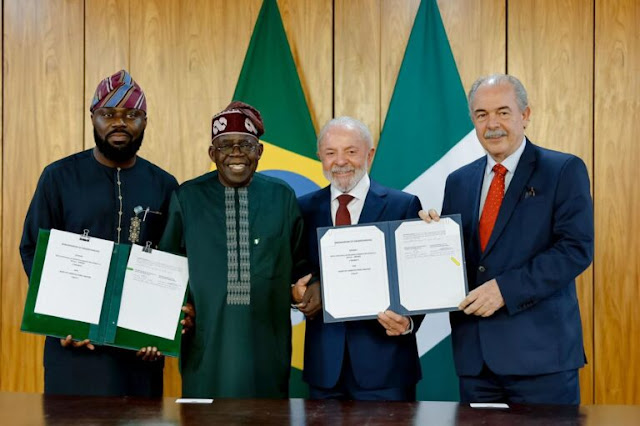In a groundbreaking development for Nigeria’s agricultural sector, the Bank of Agriculture (BOA) has entered into a landmark Memorandum of Understanding (MoU) with Brazil’s National Bank for Economic and Social Development (BNDES). This historic pact, signed during President Bola Ahmed Tinubu’s state visit to Brazil on August 29, 2025, marks a significant milestone in Nigeria’s quest to become a global leader in agricultural production and export. The agreement, witnessed by President Tinubu and his Brazilian counterpart, President Luiz Inácio Lula da Silva, is poised to unlock vast opportunities for agricultural development, strengthen food security, and reposition Nigeria as a key player in the global agricultural market.
The MoU, signed by BOA’s Managing Director and Chief Executive Officer, Ayo Sotinrin, and BNDES President, Aloizio Mercadante Oliva, outlines a multifaceted collaboration aimed at transforming Nigeria’s agricultural landscape. Key components include the co-development of urea projects for export to Brazil, joint investment in seed technologies in partnership with Brazil’s leading agricultural research agency, and the establishment of a credit facility to finance agricultural equipment for both small- and large-scale farmers. This partnership not only strengthens bilateral ties between Nigeria and Brazil but also sets the stage for sustainable economic growth, technological advancement, and enhanced food security across both nations.
In a statement following the signing, BOA expressed profound gratitude to Presidents Tinubu and Lula da Silva for their visionary leadership and commitment to deepening agricultural ties. The bank described the agreement as “a major leap toward sustainable development,” emphasizing its potential to drive innovation, boost productivity, and create opportunities for farmers and agribusinesses. Analysts have hailed the pact as a game-changer, predicting that it will elevate Nigeria’s status as a leading agricultural exporter while fostering technology transfer and economic diversification.
The Context: Nigeria’s Agricultural Ambitions
Nigeria, often referred to as the “Giant of Africa,” has immense agricultural potential, with vast arable land, a favorable climate, and a population of over 200 million, making it one of the largest consumer markets in the world. Agriculture has historically been a cornerstone of Nigeria’s economy, employing over 60% of the workforce and contributing significantly to GDP. Crops like cassava, yams, maize, and rice, along with cash crops such as cocoa, oil palm, and groundnuts, have positioned Nigeria as a key agricultural producer in Africa. However, the sector has faced challenges, including limited access to modern technology, inadequate financing, and infrastructural deficits, which have constrained its ability to compete globally.
Since assuming office in May 2023, President Tinubu has prioritized agricultural transformation as part of his “Renewed Hope” agenda. His administration has introduced policies aimed at boosting food security, increasing agricultural exports, and reducing Nigeria’s dependence on oil revenues. Initiatives such as the National Agricultural Development Fund and the revitalization of the BOA underscore the government’s commitment to modernizing the sector. The MoU with BNDES aligns perfectly with these objectives, offering a pathway to leverage international expertise and resources to address longstanding challenges.
Brazil, a global agricultural powerhouse, is an ideal partner for Nigeria’s ambitions. With its advanced agricultural technologies, robust research ecosystem, and status as one of the world’s largest exporters of soybeans, beef, and sugarcane, Brazil brings invaluable experience to the partnership. The country’s success in transforming its agricultural sector through innovation and investment serves as a model for Nigeria, which seeks to emulate this trajectory while addressing its unique challenges.
The MoU: A Blueprint for Collaboration
The MoU between BOA and BNDES is a comprehensive agreement that addresses multiple facets of agricultural development. Its three key pillars—urea production, seed technology, and equipment financing—reflect a strategic approach to enhancing productivity, fostering innovation, and empowering farmers.
Co-Development of Urea Projects for Export: Urea, a critical nitrogen-based fertilizer, is essential for boosting crop yields and ensuring food security. Nigeria, with its abundant natural gas reserves—a key raw material for urea production—has the potential to become a major player in the global fertilizer market. The MoU outlines collaboration between Nigeria and Brazil to develop urea projects specifically for export to Brazil, which relies heavily on imported fertilizers to sustain its massive agricultural sector. This initiative not only creates a new revenue stream for Nigeria but also strengthens trade ties between the two nations. By leveraging Brazil’s expertise in large-scale agricultural inputs, Nigeria can enhance its production capacity and establish itself as a reliable supplier in the global market.
Joint Investment in Seed Technologies: The partnership with Brazil’s foremost agricultural research agency, likely the Brazilian Agricultural Research Corporation (Embrapa), is a cornerstone of the MoU. Embrapa is renowned for its pioneering work in developing high-yield, climate-resilient seeds and sustainable farming practices, which have transformed Brazil into an agricultural giant. Through this collaboration, Nigeria will gain access to advanced seed technologies tailored to its diverse agroecological zones. Improved seeds are critical for increasing crop yields, reducing vulnerability to climate change, and ensuring food security. For Nigerian farmers, access to these technologies could mean higher incomes, greater resilience to environmental challenges, and the ability to compete in global markets.
Credit Facility for Agricultural Equipment: One of the biggest barriers to agricultural productivity in Nigeria is the lack of access to modern equipment. Many farmers rely on manual labor or outdated tools, which limit efficiency and output. The MoU establishes a credit facility to finance agricultural equipment for both Nigerian and Brazilian farmers investing in Nigeria’s agriculture sector. This facility will support small-scale farmers, who form the backbone of Nigeria’s agricultural economy, as well as large-scale agribusinesses seeking to expand operations. By providing affordable financing for tractors, irrigation systems, and other machinery, the partnership aims to modernize farming practices, boost productivity, and create jobs.
The Broader Implications: Economic and Social Impact
The Nigeria-Brazil agricultural partnership has far-reaching implications for both countries and the global economy. For Nigeria, the MoU represents a strategic opportunity to diversify its economy and reduce its reliance on oil, which has historically accounted for over 80% of export revenues. By investing in urea production and agricultural exports, Nigeria can tap into new markets, generate foreign exchange, and create employment opportunities across the agricultural value chain. The focus on seed technology and equipment financing will also enhance productivity, enabling farmers to produce more food and raw materials to meet domestic and international demand.
Food security, a pressing issue in Nigeria, stands to benefit significantly from this agreement. The country has faced challenges in meeting the nutritional needs of its growing population, with rising food prices and supply chain disruptions exacerbating hunger in some regions. By increasing access to high-yield seeds and modern equipment, the partnership will help farmers produce more food efficiently, reducing dependence on imports and stabilizing prices. This aligns with President Tinubu’s goal of achieving food self-sufficiency and ensuring that no Nigerian goes hungry.
The collaboration also strengthens Nigeria’s position in the global agricultural market. Analysts believe the agreement could position Nigeria as a leading exporter of agricultural products, particularly fertilizers and crops suited to its climate. Brazil, with its established markets in Europe, Asia, and the Americas, provides a ready demand for Nigerian exports, creating a mutually beneficial trade relationship. The technology transfer embedded in the MoU will further enhance Nigeria’s capacity to produce high-quality agricultural products that meet international standards.
For Brazil, the partnership offers access to Nigeria’s vast market and resources. Nigeria’s natural gas reserves make it an attractive partner for urea production, while its large consumer base presents opportunities for Brazilian agribusinesses to invest in processing, distribution, and retail. The credit facility will also enable Brazilian farmers to expand their operations in Nigeria, fostering cross-border investment and collaboration.
Nigeria-Brazil Relations: A Growing Partnership
The MoU is a testament to the deepening relationship between Nigeria and Brazil, two nations with shared histories and aspirations. Both countries are regional leaders—Nigeria in Africa and Brazil in South America—with diverse populations and resource-rich economies. Their partnership is rooted in a shared commitment to South-South cooperation, a framework that emphasizes collaboration among developing nations to address common challenges.
Historically, Nigeria and Brazil have maintained strong diplomatic ties, with trade and cultural exchanges dating back decades. Brazil’s support for African development, particularly through technical cooperation programs, has strengthened this relationship. The MoU builds on this foundation, creating a platform for sustained collaboration in agriculture, one of the most critical sectors for both nations.
President Tinubu’s state visit to Brazil, during which the MoU was signed, underscores the strategic importance of this partnership. The presence of Presidents Tinubu and Lula da Silva as witnesses to the signing highlights the high-level commitment to ensuring the agreement’s success. Both leaders have championed policies aimed at uplifting their people, with Tinubu focusing on economic diversification and Lula da Silva emphasizing social inclusion and sustainable development. Their shared vision provides a strong foundation for the Nigeria-Brazil agricultural partnership.
The Role of BOA and BNDES
The Bank of Agriculture (BOA), Nigeria’s premier agricultural financing institution, plays a pivotal role in implementing the MoU. Established to provide credit and support to farmers and agribusinesses, BOA has been instrumental in driving Nigeria’s agricultural transformation. Under the leadership of Ayo Sotinrin, the bank has prioritized partnerships that enhance access to finance, technology, and markets. The MoU with BNDES aligns with BOA’s mission to empower farmers and promote sustainable agriculture, positioning the bank as a key player in Nigeria’s economic advancement.
BNDES, Brazil’s National Bank for Economic and Social Development, brings a wealth of experience to the partnership. As one of the largest development banks in the world, BNDES has a track record of financing transformative projects in agriculture, infrastructure, and industry. Its president, Aloizio Mercadante Oliva, has emphasized the importance of international cooperation in achieving sustainable development goals, making the partnership with BOA a natural fit.
Together, BOA and BNDES will leverage their expertise and resources to ensure the MoU’s objectives are met. The collaboration will involve close coordination with government agencies, research institutions, and private sector stakeholders in both countries, ensuring a holistic approach to implementation.
Challenges and Opportunities
While the MoU holds immense promise, its success will depend on overcoming several challenges. Nigeria’s agricultural sector faces structural issues, including inadequate infrastructure, limited access to markets, and vulnerability to climate change. The implementation of the credit facility and seed technology initiatives will require robust systems to ensure transparency, accessibility, and impact. Additionally, logistical challenges, such as transporting urea exports to Brazil, will need to be addressed to maximize the partnership’s benefits.
Security concerns in some parts of Nigeria, particularly in the northern regions, could also pose challenges to agricultural investment. Ensuring the safety of farmers and agribusinesses will be critical to attracting Brazilian investors and sustaining the partnership. The Nigerian government’s ongoing efforts to address insecurity, including through community policing and military operations, will play a role in creating a conducive environment for the MoU’s implementation.
Despite these challenges, the opportunities are vast. The partnership aligns with global trends toward sustainable agriculture and food security, positioning Nigeria and Brazil as leaders in addressing these issues. The MoU also offers a model for other African nations seeking to leverage international partnerships to transform their economies.
A Vision for Sustainable Development
In its statement, BOA expressed gratitude to Presidents Tinubu and Lula da Silva for their commitment to deepening agricultural ties, describing the MoU as “a major leap toward sustainable development.” This sentiment reflects the broader vision of the partnership, which goes beyond economic gains to encompass social and environmental goals. By promoting sustainable farming practices, reducing food insecurity, and creating jobs, the agreement contributes to the United Nations’ Sustainable Development Goals, particularly those related to zero hunger, decent work, and economic growth.
The partnership also underscores the importance of international cooperation in addressing global challenges. As the world grapples with climate change, population growth, and economic inequality, collaborations like the Nigeria-Brazil MoU offer a blueprint for harnessing shared resources and expertise to create lasting impact.
Conclusion
The historic MoU between Nigeria’s Bank of Agriculture and Brazil’s National Bank for Economic and Social Development marks a new chapter in Nigeria’s journey toward economic advancement. By fostering collaboration in urea production, seed technology, and equipment financing, the agreement unlocks vast opportunities for agricultural development, trade, and food security. Witnessed by Presidents Tinubu and Lula da Silva, the pact reflects the shared vision of two nations committed to sustainable progress and South-South cooperation.
For Nigeria, the MoU is a chance to diversify its economy, empower farmers, and establish itself as a global agricultural leader. For Brazil, it offers access to Nigeria’s resources and market, strengthening bilateral ties. As the partnership takes shape, it has the potential to transform lives, boost productivity, and set a precedent for international collaboration in agriculture. With the support of visionary leaders and dedicated institutions, Nigeria and Brazil are poised to march toward a future of boundless possibilities, together etching their names on the global map of sustainable development.





